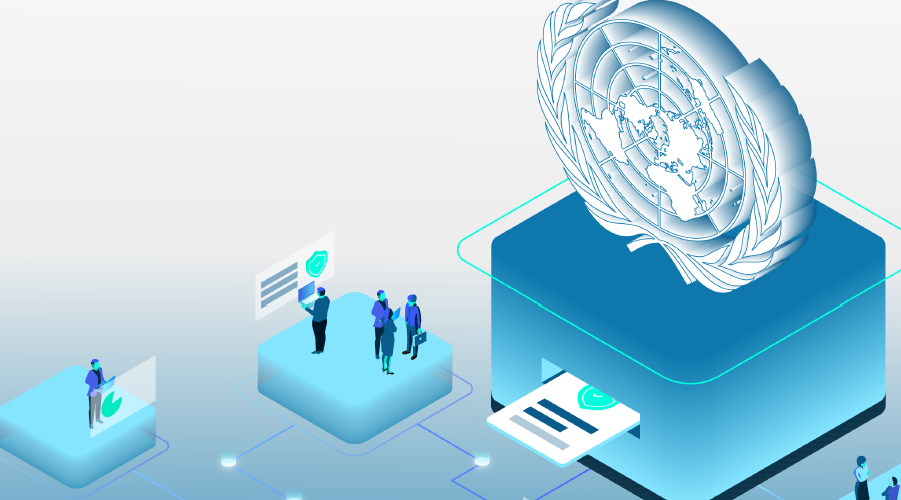The Cybersecurity Tech Accord presents the results of Working Group 3 (WG3) of the Paris Call, focused on “Advancing the UN negotiations with a strong multistakeholder approach.”
A new milestone for a groundbreaking initiative
This week marks the third anniversary of the Paris Call for Trust and Security in Cyberspace. The initiative has united governments, industry, civil society, and academia on a shared path to advance greater stability in cyberspace. The Paris Call’s nine principles, including protecting individuals and infrastructure and preventing the proliferation of malicious software, provide both a call to action and a firm foundation for international multistakeholder cooperation. To date, the Paris Call has attracted over 1,200 supporters, including 80 national governments, in the largest ever international commitment to cybersecurity principles. With news this week that the United States is joining with many other like-minded governments, including the entirety of the EU, in endorsing the Paris Call, the agreement continues to gain momentum and provide a platform for cooperation.
At this important milestone for the Paris Call, we are publishing the final report of Paris Call Working Group 3, “Advancing the UN negotiations with a strong multistakeholder approach,” which the Cybersecurity Tech Accord has chaired this year. The report, “Multistakeholder participation at the UN: The need for greater inclusivity in the UN dialogues on cybersecurity,” is the result of months of engagement, discussion and reflection within the Paris Call community on the role that non-state actors can play in international dialogues on peace and security in cyberspace. This included several workshops, consultations, and independent research. As an early supporter of the Paris Call, the Cybersecurity Tech Accord was honored to be tasked by the French Ministry for Europe and Foreign Affairs to lead this effort.
A timely new report on multistakeholder inclusion
Following the conclusions of twin UN dialogues on cybersecurity earlier this year – the Group of Governmental Experts (GGE) and the Open-Ended Working Group (OEWG) – the work of WG3 has proven especially timely as the international community now explores what the next generation of cybersecurity dialogues will look like. While both the GGE and OEWG final reports affirmed consensus around norms and international law in cyberspace, they did little to advance new or more robust expectations, and neither format has effectively provided for multistakeholder participation/inclusion thus far. Amid increasing conflict and nation-state attacks online, there is clear need for new and more ambitious approaches to international engagement in this space.
In that spirit, the new report from WG3 intends to serve as a reference guide for policymakers and UN officials to support greater multistakeholder inclusion in cybersecurity dialogues moving forward. When it comes to setting and upholding expectations in cyberspace, where overlapping roles and responsibilities are shared across stakeholder groups, the voices of industry, civil society and academia are indispensable. This is especially true when it comes to the technology industry, as it is responsible for most of the ICT infrastructure that makes up cyberspace, and often serves as the first line of defense. These voices and perspectives simply must be included in discussions around how to secure the online world.
Building on a legacy of multistakeholder inclusion
The WG3 study examines the long tradition of multistakeholder participation at the UN, where the role of non-governmental entities has been widely recognized since the organization’s inception. Several case studies are taken into consideration, including from UN First Committee processes on disarmament and threats to peace. The study also explores the structures of recent UN dialogues on cybersecurity and why they have featured such limited participation from non-governmental stakeholders, despite increasing recognition of the value of multistakeholder inclusion from a growing number of member states.
The study encourages the UN to consider a new process for multistakeholder inclusion in cybersecurity dialogues to ensure that, at a basic level, such inclusion is:
- well-structured, to ensure that it is constructive and properly received by member states;
- regular, to respond to the evolving nature of cyberspace and the threat landscape; and
- systematic, rather than ad hoc to ensure robust participation.
The study concludes with seven specific recommendations for structuring meaningful multistakeholder participation, including the importance of establishing an inclusive accreditation process, ensuring timely sharing of information between parties, and establishing greater collaboration mechanisms for norms implementation.
With a new OEWG on cybersecurity kicking off this December, and set to run through 2025, ensuring more inclusive deliberations should be a top priority. At the same time, the international community should also consider alternatives to term-limited, ad hoc dialogues like the OEWG. WG3 hopes that states will consider a new proposal, supported by over 50 states, to reform UN cybersecurity negotiations. The so-called “Programme of Action” (PoA) proposes to establish a permanent, inclusive, consensus-based and action-oriented international instrument to advance responsible behavior in the use of ICTs in the context of international security. The PoA could also support a more robust and formal exchange with non-governmental stakeholders in this issue space.
WG3 is grateful for the leadership shown by the French government in launching this process of reflection and exploration to encourage UN negotiations to be more inclusive of multistakeholder voices in the future. We similarly appreciate the support of the more than 80 participating entities in WG3, including representatives from governments, private companies, and civil society groups, without whom this work would not have been possible. We look forward to assisting UN member states in their work on responsible state behavior in cyberspace and hope the study will inspire governments to strive to achieve more in these discussions.

